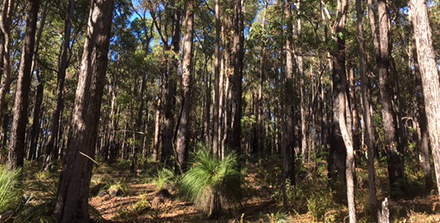
Regrowth jarrah forest south-east of Perth, logged at least three times already, now banned from harvesting by the McGowan government. This forest is ear-marked to be strip-mined for bauxite.
Let’s get one thing very clear from the start: WA Premier Mark McGowan’s decision to ban native forest harvesting in the south-west “because the trees have stopped growing and must be saved to store carbon” is nothing but a load of rubbish.
McGowan, flanked by Forestry Minister Dave Kelly and Environment Minister Amber-Jade Sanderson, shocked not just the forestry and timber industries in WA on that fateful morning of 8 September 2021, but also the staff in his government agencies responsible for managing the State’s forests, when he announced that native forest logging would cease at the end of 2023.
Why did he decide to kill off one of the few sustainable industries WA enjoys? An industry that helped the fledgling colony find its feet in the 19th century with export income, an industry that is a key part of the rural fabric of the south-west, an industry that is barely noticeable to city folk who marvel at the lush green forests they drive through on their south-west winter sojourns to wineries and chalets with wood fires, an industry that generates $0.25b every year, an industry that provides the timber for some of the finest furniture, flooring and joinery in the world?
I’ll tell you why. Because he and his fellow ministers have been hoodwinked by an “I want to feel-good” society that thinks milk comes from cartons (“I can’t bear to think that milk comes from cows having their udders squeezed twice every day”) and that timber comes from a shelf in the local hardware store (“I can’t bear to think that timber comes from a tree that gets chopped down”). It’s also because a hardcore group of anti-logging/anti-everything people got into his head and convinced him that banning logging will make him a hero of the people.
Who cares if mills close, that workers will have to find a job in the non-sustainable mining sector, that thousands of city folk will need to buy an electric heater when their local firewood supplier closes shop this winter?
And who cares about the science? McGowan has been asked numerous times to table the evidence that our forests have stopped growing, even from former Federal Assistant Forestry Minister Duniam. No response has been forthcoming – because there is no evidence!
WA’s 10-year Forest Management Plan, published by the Conservation Commission and heavily referenced, details how the south-west native forests are to be managed. The sustained timber yield modelling undertaken was reviewed by a panel of independent experts and included a “safety margin” to take account of a drying climate. Based on the allowable harvest in the Plan, and forest growth rates, the quantity of carbon stored in live trees is estimated to increase by close to 5% by 2023.
WA Premier Mark McGowan obviously doesn’t take any notice of his Conservation Commission, nor does he listen to Dr Karl Kruszelnicki. Dr Karl is perhaps Australia’s most respected scientist. He refers to the “Bullshit Asymmetry Factor” (BAF) which means it’s easy to make an emotionally charged, false claim such as “logging in our regrowth eucalypt forests is bad for the environment and causes climate change”, but to debunk that false claim using science can be exceedingly difficult.
The effects of the September 2021 announcement were immediate. Despite McGowan saying it would be “business as usual” until 31 December 2023, the offer of $10,000 to any worker who wanted to leave immediately was a dirty tactic to help make the industry collapse. Confidence in the industry was shattered. After months of negotiations with a tight-fisted Minister, businesses have managed to squeeze some money in compensation, but many will struggle, and none will go away satisfied.
The biggest sawmiller, Parkside Timber, has decided to take matters into its own hands. They have just closed their flagship mill at Greenbushes with the loss of 50 workers and it’s quite possible that we will soon be witnessing lawyers at 20 paces.
Simcoa, manufacturer of high-quality silicon metal at Kemerton near Bunbury and employer of nearly 400 people, need over 150,000 tonnes of hardwood for charcoal each year as a reductant. The alternative to renewable timber is imported coal. Go figure!
Many sawmillers have simply had enough and will be closing down before 2024. Perversely, the government is offering money to mills to bulldoze their infrastructure. Some live in hope that a change of government will see a reversal of the decision. “Lazarus, please give us inspiration” they cry!
The implications of what has happened in WA are serious. Anti-logging forces in other States will no doubt be watching closely. The Andrews Labor government in Victoria announced a shut-down of native timber harvesting to take effect in 2030, leaving enough time for a new State government to step up and right the ship. Green forces in NSW and Tasmania are also pushing to shut down sustainable timber harvesting. They must be opposed at every opportunity.
Fortunately, both Liberal and Labor at a Federal level are maintaining their support for the native timber industry. And, as Dr Karl would say, even though humans tend to base their thinking on emotion and tribal loyalties, its vital that we take heed of what foresters and forest scientists say about forest management.
John Clarke is a West Australian forester who worked for the State forest agencies for 36 years before embarking on private work for the forestry and timber industries in WA as “JC Forestry”. He is a former chair of the WA Division of Forestry Australia, a member of the Leschenault Timber Industry Club, an active member of Birdlife Australia and vice-chair of the pro-prescribed burning lobby group the Bushfire Front”.






